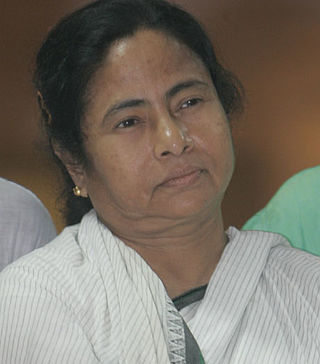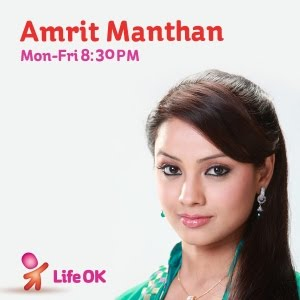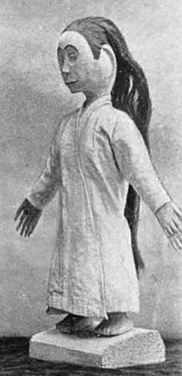
The Communist Party of India (Marxist) (abbreviated as CPI(M)) is a communist political party in India. It is the largest communist party in India in terms of membership and electoral seats, and one of the national parties of India. The party was founded through a splitting from the Communist Party of India in 1964 and it quickly became the dominant fraction.

Jyoti Basu was an Indian Marxist theorist, communist activist, and politician. He was one of the most prominent leaders of Communist movement in India. He served as the 6th and longest serving Chief Minister of West Bengal from 1977 to 2000. He was one of the founding members of the Communist Party of India (Marxist). He was the member of Politburo of the party since its formation in 1964 till 2008. He was also the member of West Bengal Legislative Assembly 11 times. In his political career, spanning over seven decades, he was noted to have been the India's longest serving chief minister in an elected democracy, at the time of his resignation. He was proposed for the post of Prime Minister of India for four times.

Mamata Banerjee is an Indian politician who is serving as the eighth and current chief minister of the Indian state of West Bengal since 20 May 2011, the first woman to hold the office. Having served multiple times as a Union Cabinet Minister, Mamata Banerjee became the Chief Minister of West Bengal for the first time in 2011. She founded the All India Trinamool Congress in 1998 after separating from the Indian National Congress, and became its second chairperson later in 2001. She is often referred to as Didi.

Brinda Karat is an Indian marxist politician, and former member of Rajya Sabha as a Communist Party of India (Marxist) member, from 11 April 2005 to 2011 for West Bengal.

Morning Raga is a 2004 Indian English-language musical drama film written and directed by Mahesh Dattani, and produced by K. Raghavendra Rao under Arka Media Works. It stars Shabana Azmi, Prakash Kovelamudi, Perizaad Zorabian, Lillete Dubey and Nassar. The film has an extensive use of English dialogue, in addition to Godavari dialect of Telugu language.

Sitaram Yechury is an Indian Marxist politician and the General Secretary of the Communist Party of India (Marxist), and a member of the Politburo of the CPI(M) since 1992. Previously, he was a Member of Parliament, Rajya Sabha from West Bengal from 2005 to 2017.
Aruvanpalli Puthiyapurakkal Abdullakkutty (born 8 May 1967) is an Indian politician. He was elected as the National Vice President of the Bharatiya Janata Party on 26 September 2020. He has also served as the BJP Vice President of Kerala state. He is also a former member of Lok Sabha from Kannur and former MLA from Kannur constituency of Kerala state.

The Kilvenmani massacre was an incident in Kizhavenmani village, Nagapattinam district of Tamil Nadu state in India on 25 December 1968 in which a group of around 44 people, the families of striking Dalit village labourers, were murdered by a gang, allegedly led by their landlords. The chief accused was Gopalakrishnan Naidu.
Manikuntala Sen was one of the first women to be active in the Communist Party of India. She is best known for her Bengali-language memoir Shediner Kotha, in which she describes her experiences as a woman activist during some of the most turbulent times in India's history.

Nandigram Violence refers to the violence in Nandigram, West Bengal, India, in 2007 due to the land acquisition for a project taken up by the CPI(M)-led Government of West Bengal to create a chemical hub, a type of special economic zone (SEZ). The policy led to an emergency in the region, and 14 people died in a police shooting.

Hatim is an Indian television series that aired on Star Plus from 26 December 2003 until 12 November 2004. It has elements of fantasy, drama, and many other genres. It was directed by Amrit Sagar and is based on a Persian story which purports to recount the adventures of the renowned Hatim al-Tai, of the Tayyi tribe of Arabia.

Grihasti is a family drama produced by Sphere Origins, that aired on Star Plus during weekday afternoons. The show premiered on 25 February 2008 and aired until 27 March 2009.

Sabki Laadli Bebo was a Popular Indian television drama-series that aired on STAR Plus. The series premiered on 11 March 2009 and was produced by Endemol India and Sachidanand Productions. It was concluded on 25 March 2011.
On 28 May 2010, a Jnaneshwari Express train derailed at about 1 a.m. in the West Midnapore district of West Bengal, India. It was disputed as to whether sabotage or a bomb caused damage on the railway track, which in turn led to the derailment, before an oncoming goods train hit the loose carriages, resulting in the deaths of at least 148 passengers.

Assembly election was held in Indian state of West Bengal in 2011 to elect the members of West Bengal Legislative Assembly as the term of the incumbent government was about to expire naturally. The election was held in six phases between 18 April and 10 May 2011 for all the 294 seats of the Assembly.

Amrit Manthan is an Indian television soap opera, which premiered on 26 February 2012 and ran through 2 August 2013 on Life Ok. It is the story of two sisters who become each other's enemies. This show was also broadcast as Bari Behna on Star Utsav.

T. P. Chandrasekharan was an Indian politician who was the founder of Revolutionary Marxist Party (RMP), a breakaway group of Communist Party of India (Marxist). Born in Onchiyam, a rural village in Kozhikode district in Kerala, he posthumously shot to national prominence after he was hacked to death on 4 May 2012; CPI(M)'s local organization is widely blamed as the perpetrator of the murder.

The langsuyar, also lang suir or langsuir, is a female revenant in Malay and other mythologies in the Malay Archipelago. The word is derived from the Malay word for eagle.

Kanhaiya Kumar is an Indian political activist who served as the president of the Jawaharlal Nehru University Students' Union and leader of the All India Students Federation (AISF). He served as National Executive Council member of Communist Party of India. He joined Indian National Congress on 28 September 2021.
Sarala Roy (1861-1946) was an Indian educator, feminist, and social activist. She was one of the first women to matriculate from Calcutta University, and was the first woman to be a member of the University Senate. She founded a school for girls and several women's educational charities, and was a founding member and later, the President of the All India Women's Conference. As President of the All India Women's Conference in 1932, she played a key role in organizing efforts towards women's suffrage, and against child marriage. She was also a strong supporter of educational rights for women and girls.
















